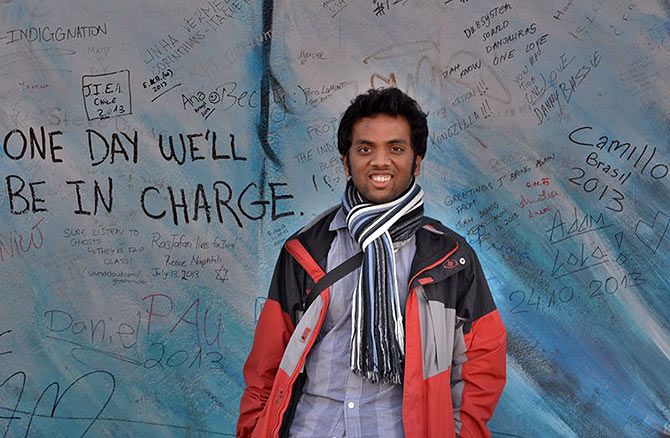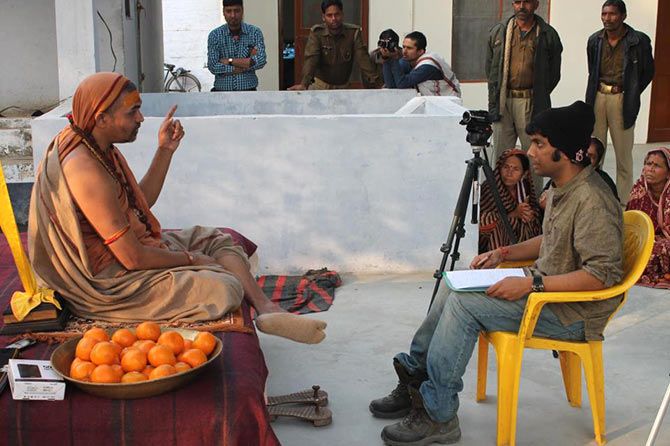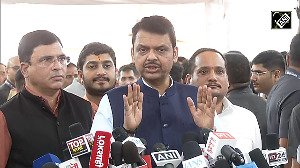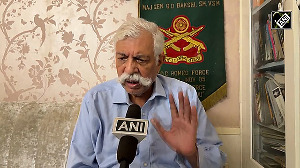"We already have engineers and medical graduates, but we need more IAS and civil service professionals, we need lawyers and political experts to spearhead this cause.
"We need more people to write open letters to the President and Prime Minister.
"The RTI Act is your weapon. Use it to get facts and information you want.
Former Watson Fellow and social entrepreneur Srikar Gullapalli talks about the issues affecting India's growth and tells us why he wants more people to actively participate in building a bright future and put India on the global map.

When his peers were keen on studying engineering and medicine, Srikar Gullapalli was bitten by the 'social upliftment' bug.
The 23-year-old has stayed committed to the cause.
His life took a U-turn when he got the opportunity to travel to seven countries, between 2013 and 2014, to study citizen-state relationship as part of the Watson scholarship (instituted in the memory of Thomas J Watson, the founder of IBM).
Through the assignment, he interviewed key political figures and compiled crucial data that would help him understand how to deal with issues like tribal rehabilitation, militant movements and marginalised communities back home.
Having graduated in mathematical economics and political science from Colgate University, in the US, the young achiever is now readying to pursue a post-graduation degree in Public Administration at Princeton University.
In March 2015, he received admission offers from six international universities: Princeton, Harvard, Maxwell Institute, Duke University, Georgetown University and Carnegie Mellon University.
He picked Princeton because he felt it was best when it came to his subject of interest -- public administration.
His comparative study on 'Politics of Performance: A Comparative Study of Delivery of Good Governance by different Political Parties in India' under the guidance of Vinay Sahasrabudde, director, Public Policy Research Centre (PPRC), New Delhi was released by Prime Minister Narendra Modi this year. (external link)
Since December 2014, he has been working with the ministries of health, drinking water and sanitation, in Delhi, researching the institutional gaps that exist in the current policies and how citizens can avail of better facilities.
We caught up with the young achiever who will be travelling to Princeton in September 2015, to find out how he plans to build a better India.
What are the problems coming in the way of India's development?
We have a lot of policies, but the problem lies in execution.
Take, for example, the Land Acquisition Bill.
No one seems to understand the cause and effect of this Bill.
One needs to understand why the displacement is taking place and what are we doing about it.
Most of them (the displaced) do not have land of their own.
Besides, 50 per cent of the people in villages, including youngsters, want an urban job so they relocate to the cities and most of them never go back.
There is migration happening across villages in India.
Add to this the number of projects that are lying unattended.
At least 40 per cent of land development projects in India are currently behind schedule.
I feel we must have a system where unless we execute the existing projects, we don't start or approve new ones.
Then there is the cultural divide, population expansion, and political debates that further delay projects.
Our collective aim must be to try and address these institutional gaps and bring in more clarity and transparency in execution.
We need to find out where the money goes and bring in more accountability in the whole process – perhaps a website where all this data can be uploaded and tracked.
Also, some of the policies and colonial laws haven't been reformed since the time they were made. We need to reform our laws and policies to meet the present day requirements.
Why did you choose to go to college abroad and not in India?
At the age of 17, I wasn't sure about my career.
I was looking for a flexible course that allowed me to study civics, advanced English and political science. Indian universities did not offer me that flexibility.
I did not want to be pigeon-holed and take up a course for the sake of completing my graduation.
At the same time, I wanted to study how things are managed internationally. So I picked Colgate University.
But whenever I had the chance, I preferred to work in India.
When I was chosen for a National Geographic project, I could have picked any country.
I chose to work on the Ganga rejuvenation and spent months interacting with seers and political leaders, trying to understand how we can bring positive change.
Tell us more about Shuddhify and what you achieved through it.
In 2011, I started Shuddhify as a social blog, funded by The World Bank Institute and British Council.
I would collect strategic data on corrupt practices in and around Bangalore.
For two years, I conducted a survey across nine government agencies and found large gaps in the system.
I compiled a report on this and submitted it to the Karnataka government.
When I was compiling this data, I received a lot of threatening calls from police officers.
I did not stop or heed them and went ahead with the report. In these times of corruption, civic activism is very risky, but someone has to start and lead the change.
Shuddhify's findings on development policies were published in the Times of India's Bangalore edition, in August 2012.
The research findings were picked by the state government as one of the best policy papers which is part of the recommendations of the Sakala scheme of the Karnataka government (the scheme provides guarantee of service to citizens). This was an achievement in itself.

What did you learn from your international assignments?
When I was picked for the Watson scholarship there were 40 other students from the US.
More than 1000 had applied for it.
Through the scholarship, I got to travel to diverse countries such as New Zealand, Thailand, Turkey, Syria and Spain.
I picked these countries because I felt they all had something in common with India.
The issues are more or less the same the world over -- poverty, separatist movements, health and sanitation etc.
But each country has a different way to solve it.
We need to learn from the positives from other countries and work out a way to implement them in our country.
In your opinion, how can we bring about change?
We need more youngsters to take part in policy making.
We already have engineers and medical graduates, but we need more IAS and civil service professionals, we need lawyers and political experts to spearhead this cause.
People need to understand that the constitutional law is for real and it is there for everyone to touch and feel.
In Bangalore, there is incredible amount of civic engagement happening with the involvement of local bodies.
We need more people to write open letters to the President and Prime Minister, write more editorials in newspapers and start meaningful political debates that will educate and inspire people to join the campaign.
The RTI Act is your weapon. Use it to get facts and information you want.
In India, we see all the hype and energy from youngsters only pre and during the elections.
The period between elections has little or no engagement from the citizens. This needs to change.
What would be your advice to young readers?
As I mentioned, we need more young leaders in Parliament.
Between 1952 and '57, about 33 per cent of representation in the Lok Sabha was from those under the age of 40.
Today, the average age of members is 50-plus and only 13 per cent are under the age of 40.
A person who is 75 years old is too old to be making decisions for a country where more than 50 per cent of the population is below the age of 30.
There has to be a healthy mix of ideas and experience -- a mix of smart young people with ideas, and experts with experience.
Much as people disregard it as corrupt and apathetic, politics affects each one of us.
If you want change, you must get your hands dirty.
It's not a choice but a responsibility we all share for the country we belong to.
There is a famous line in the Bhagwad Gita: 'It is better to live your own destiny imperfectly than to live an imitation of somebody else's life with perfection.'
Your advice to students who are looking to study abroad?
• Be prepared to negotiate for a lot of things that you were comfortable with in your home country -- the luxury of food, relaxation from daily chores etc. You are mostly on your own and will have to learn to do things independently.
• Develop organic ways to solve your problems.
• Explore your academic freedom -- make the most of the flexibility your international programme offers.
• Look for work opportunities and see if you can get people to fund projects and ideas in your home country.
• Do not restrict yourself to Indian friends and communities. Network with people beyond nationalities and cultures; be tolerant and humble.
Photographs: Kind courtesy Srikar Gullapalli/Facebook











